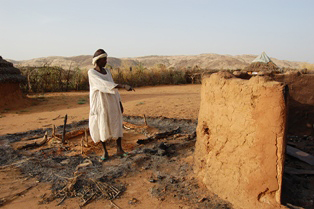Weeks after fighting between government and rebel forces in North Darfur, aid workers have yet to reach thousands of displaced civilians who sought refuge in nearby mountains and forests.
The clashes took place more three weeks ago, but violence has continued in North Darfur. Last week, there were four armed robberies and three hijackings targeting aid compounds and vehicles.
The International Committee of the Red Cross (ICRC), which sent a team to areas north and west of Disa and Birmaza, found that the majority of those displaced had gone to villages where they had access to some food and shelter.
"But there are some who are in the middle of nowhere - not a village, not a well, not a field, nothing," Giuliano Vascotto, head of the ICRC in North Darfur, told IRIN. "This is the worrying minority."
ICRC's assessment was, however, cut short when two of its cars were hijacked in Kutum, the nearest town.
"The fighting is still fresh," Laurent Bukera, head of the UN World Food Programme (WFP) in North Darfur, told IRIN. "People are hiding more than moving to identifiable areas. There has been movement but not to [camps for displaced people] as yet."
Gregory Alex, head of the UN Office for the Coordination of Humanitarian Affairs (OCHA), said: "There are people out there who need assistance; we just have not been able to get to them. We don't know how many people have fled, how many villages have been emptied, whether they are destroyed or not."
Some 1,000 to 2,500 newly displaced people have arrived in Kalimando, Dar al Salam area, south of the state capital of El Fasher, according to OCHA. The NGO Action Contre la Faim confirmed a few dozen arrivals in Shangil Tobay village, southeast of Khazan Tungur.
Several villages in Tabit area were affected. All together, up to 20,000 people are believed to have moved towards Fanga area, at the foot of the Jebel Marra Mountains. Another 10,000 to 15,000 may have been displaced in Disa and Birmaza.
Alex said recent violence had "tightened the stranglehold" on the humanitarian community. "When we make it through to these places, is it going to be too late?"
The UN Mission in Darfur (UNAMID) tried twice to visit two settlements in Disa and Birmaza, some 90km north of Kutum and Khazan Tungur village, southwest of the state capital El-Fasher. Both times, the UNAMID helicopters were shot at and forced to turn back.
From the air, peacekeepers could see people in the mountains, Capt Shumani Matenda, UNAMID public information officer, told IRIN.
One displaced civilian, Abdullah Isshac, told IRIN he had hidden in the mountains for a week before returning to a camp for internally displaced people (IDPs) in the northern town of Tawila.
Effects of violence
Isshac said he was working on a farm in Khazan Tungur when government troops stormed the village of Masal. He ran to the mountains, where he hid for a week before returning to the village, only to find homes looted and burned.
|
Photo: IRIN  |
| Displaced civilians in Tawilla town |
"The government [troops] said it was only looking for rebels. It said it didn't want to harm the people," he said. "But the rebels are out in the mountains, not in the village."
In the town of Tabit, east of Khazan Tungur, Mohammed Ahmad said most inhabitants were sleeping a few kilometres outside the village, under trees or in the empty river bed.
"We are afraid of the [bomber] planes," he said, after showing IRIN holes in the ground where bombs fell a few weeks earlier. During the day, the men come back to the village to get food, he said, but every night sleep outside.
Leaders of Zamzam camp told WFP that some of the IDPs had returned, as they do seasonally, to their areas of origin to care for their farms. But when fighting broke out, they returned to camps.
"If people are not able to go back and collect the harvest, they will face a problem," Vascotto said.
Aid workers under fire
By August, this year's death toll of humanitarian personnel had reached 11. Another 155 had been abducted, 208 vehicles hijacked and 22 convoys attacked or looted.
GOAL relocated its international staff from Kutum to El Fasher after its compound was broken into last week. In July, Médecins sans Frontières Spain closed its offices in Tawila and Shangil Tobay after armed robberies.
Partner Aid International has also stopped operations in Khazan Tunger after its clinic was damaged during recent fighting, leaving 20,000 people without medical care.
Sudan claims 10,000 people have been killed in more than five years of fighting between government and rebel forces in Darfur, but the UN estimates the number at 300,000, with more than 2.5 million displaced.
Related story: Thousands at risk as Darfur violence restricts aid deliveries
ha/eo/mw
This article was produced by IRIN News while it was part of the United Nations Office for the Coordination of Humanitarian Affairs. Please send queries on copyright or liability to the UN. For more information: https://shop.un.org/rights-permissions





